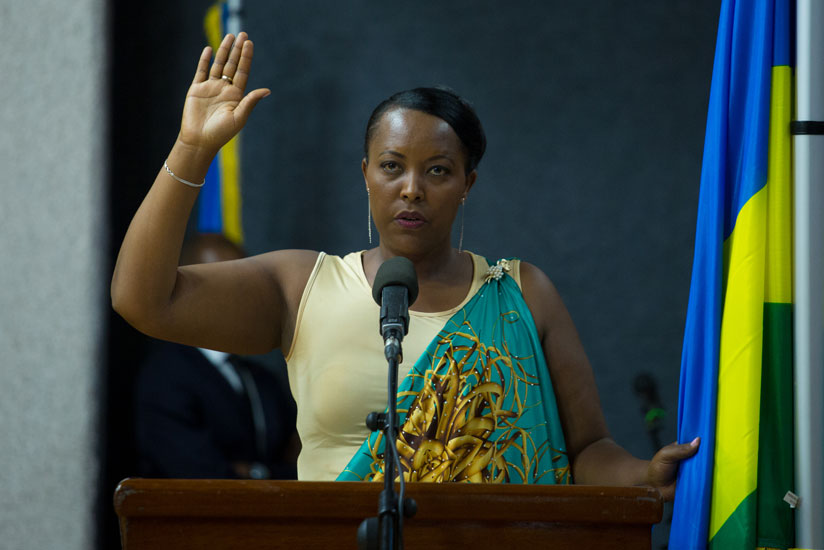The Minister for Gender and Family promotion, Esperance Nyirasafari, has warned parents and guardians over physical abuse of children while disciplining them.
Nyirasafari said physical abuse of children was not a guarantee that they will stop behaving badly and argued that children need to be taught good manners by setting good examples and positive disciplining which doesn’t include use of violence.
“Even a slap is not acceptable. Hitting, slapping, beating, thumping, pinching a child only reinforces violence. Some parents or guardians think it’s ok to slap a child as long as they are not violent enough to incur serious injury but they can’t measure the pain and don’t realize the damage they will make once they keep on repeating it overtime the child is wronged,” she argued.
She suggests that as an example of the non- violent disciplining models is giving a child does something wrong, give them a time-out – that is make them sit in a quiet place away from others. A time-out gives you time to cool off and also gives the child time to think about his behavior. After the time-out discuss the problem with the child.
Taking away something the child likes is another option if your child has misbehaved. You can take away a favourite toy or snack for a time or prevent them from playing with friends for a particular period.
The call came after a study that was conducted by the Ministry of Health in partnership UNICEF and the United States Center for Disease Control and Prevention (CDC) about Violence against children and youth (VACYS 2015-2016), which revealed high prevalence of physical, sexual and emotional abuse against children and youth.

The study revealed that half of the young women aged 18-24 who were interviewed about violence during childhood had experienced some form of violence before the age of 18, compared to 65% of males. Physical violence against boys is the most common form of violence. 37.2% of girls have experienced violence compared to 59.5% of boys.
“As an adult, just imagine how you would feel if someone tried to correct your behavior by hitting you!!! Don’t you think your child has feelings just like you do?
Providing discipline and guidance to your child should not mean punishing your child. There are different ways to teach your child lessons in acceptable behavior that you want them to learn. Set the right example for your child. Children learn by example.
They watch you and follow what you do. Taking away something the child likes is another option if your child has misbehaved. You can take away a favorite toy or snack for a time or prevent them from playing with friends for a particular period.
Again it is important to have a discussion with the child about his or her behavior and reinforce what is acceptable in the family and why it is acceptable,” she argued.
Minister Nyirasafari added that even verbally abusing or name calling a child is not acceptable. Parents should choose friendly words while rebuking their children to quit bad manners. She added that some people may still do it out of ignorance and the ministry was putting efforts in community sensitization through platforms like Umuganda, Umugoroba w’ ababyeyi (Parents’ forum) and Early Childhood Development (ECD) centres.
Research shows that physical abuse has devastating impact on children’s health and wellbeing. The study showed that 32% of young women who had experienced emotional abuse as children had considered suicide. 47% of young men aged 18-24 who had been sexually abused as a child have experienced mental distress.
Also violent sexual abuse can lead to unplanned and unwanted pregnancies: 48% of young women who had experienced sexual abuse during childhood reported unwanted pregnancy as a result of that abuse.
Parents and guardians are advised to use language that they would want to hear their child use and behave in the way they would want them to behave.
Psychologists argue that some children are afraid of this abuse and that the method doesn’t work. Unfortunately the only thing that physical punishment teaches a child is that violence is an acceptable way of solving a problem.
“Some children soon get used to the physical punishment and it means nothing to them.
Other children may rebel and act out against this harsh treatment. Sometimes parents cause serious physical and emotional damage to their children when they use corporal punishment,” Odette Uwimana, a member of Rwanda Psychologists Society said.
Some parents claimed that the reason they behave well now is because of beatings they got from their parents or educators.
“When I was young my parents would beat me whenever I wronged and I grew up believing the same way. Now that I have kids whenever they wrong I apply the same punishment so that they don’t repeat the same mistakes,” said Kagaba, a father of three.
Esperance Mukakimenyi, head of discipline at Groupe Scolaire Sainte Famille, said her experience as a teacher had shown that beating was not the best way to respond to bad behaviour.
She believes that yelling or beating is scary because it activates a child’s emotional “fight or flight” response while shutting down his or her logical thinking.
“Parents should remember that discipline is not only corporal punishment but also teaching children appropriate behavior. Effective discipline begins with acting in a manner consistent with the values you want to impart than to yell.”

